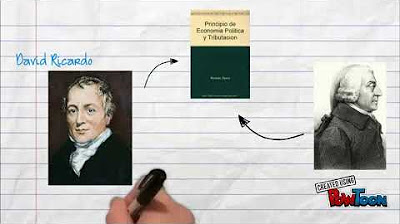Adam Smith Tercentenary | The Wealth of Nations
Summary
TLDRAdam Smith, the father of modern economics, challenged mercantilist views in his 1776 work *The Wealth of Nations*. He argued that wealth is not measured by gold, but by the living standards of a population. Smith's key ideas include the division of labor, trade, capital accumulation, natural liberty, and the invisible hand. He believed that free markets, driven by individuals' pursuit of self-interest, foster national prosperity. While advocating for minimal government intervention, Smith acknowledged the need for defense, justice, and public infrastructure, including education, to support society's well-being.
Takeaways
- 😀 Adam Smith is regarded as the founding father of modern economics and is best known for his influential book, 'The Wealth of Nations.'
- 😀 In 'The Wealth of Nations,' Smith critiques the mercantilist view that wealth is measured by the amount of gold a country possesses.
- 😀 Smith argues that true wealth lies in the living standards of a nation's population, not in gold or precious metals.
- 😀 Colonialism and protectionism, according to Smith, harm the general wealth of a nation by benefiting only wealthy merchants.
- 😀 Smith identifies five key ideas that explain the rise in living standards: division of labor, trade, capital accumulation, natural liberty, and the invisible hand.
- 😀 The division of labor, illustrated through the example of a pin factory, leads to massive increases in productivity and the availability of goods.
- 😀 Human beings have a natural tendency to engage in trade and exchange, which allows for specialization and interdependence among workers.
- 😀 Capital accumulation occurs when profits from trade are reinvested into increased production, leading to long-term wealth generation.
- 😀 Smith advocates for the system of natural liberty, where minimal government intervention allows the market to efficiently allocate resources.
- 😀 The invisible hand describes how free trade and competition, driven by individuals seeking to improve their own lives, maximize national wealth without government interference.
- 😀 Smith acknowledges the need for government intervention in three key areas: defense, justice, and public works such as education, roads, and bridges.
- 😀 Despite his belief in free markets, Smith was not blind to their potential negative outcomes and saw the government's role in addressing public goods and services.
Q & A
Who is Adam Smith and why is he significant?
-Adam Smith is known as the founding father of modern economics. He is most famous for his book 'The Wealth of Nations,' published in 1776, where he presented key economic theories that shaped economic thought, especially around free markets and the division of labor.
What is the main argument in Adam Smith's 'The Wealth of Nations'?
-In 'The Wealth of Nations,' Adam Smith argues against the mercantilist view that a nation's wealth is measured by the amount of gold it possesses. Instead, he posits that wealth is determined by the living standards of the population and the productivity of the nation.
How did mercantilists view wealth, and why did Smith disagree with this view?
-Mercantilists believed that a nation's wealth was based on its gold reserves and advocated for colonialism and protectionism to increase wealth. Adam Smith disagreed, arguing that wealth should be measured by the well-being of the entire population, not by gold.
What is the significance of the division of labor in Smith's economic theory?
-The division of labor, as explained by Smith using the example of a pin factory, shows that specialization increases productivity. By dividing tasks, workers can focus on specific roles, leading to higher output and the production of goods that become accessible to more people.
How does trade contribute to the wealth of nations according to Smith?
-Smith argued that trade is essential because it allows individuals to specialize in their areas of expertise, creating interdependence and efficiency. This interdependence enables a nation to increase productivity and wealth through the exchange of goods and services.
What is the concept of capital accumulation in Smith's theory?
-Capital accumulation refers to the process where profits from increased production are reinvested into further production, leading to steady wealth generation. According to Smith, individuals naturally aim to improve their situation through savings and investments, driving economic growth.
Why did Adam Smith reject trade restrictions and government interference?
-Adam Smith rejected trade restrictions, subsidies, and colonialism because they distorted the market and hindered free competition. He believed that the economy would be more efficient if individuals were free to make decisions based on market prices and not influenced by government intervention.
What does the 'Invisible Hand' refer to in Smith's theory?
-The 'Invisible Hand' refers to the self-regulating nature of markets. Smith believed that when individuals pursue their own interests in free markets, it leads to benefits for society as a whole, even without direct government intervention.
What are the three main roles of government in Smith's ideal system?
-According to Smith, the government should focus on three key areas: defense, justice, and the provision of public works, such as roads, bridges, and education, which are necessary for the well-being and productivity of the population.
How did Adam Smith's ideas influence modern economics?
-Adam Smith's ideas, particularly the importance of free markets, the division of labor, and the 'Invisible Hand,' have shaped the foundations of modern economic theory. His arguments continue to be relevant today, influencing economic policies and understanding of market dynamics.
Outlines

This section is available to paid users only. Please upgrade to access this part.
Upgrade NowMindmap

This section is available to paid users only. Please upgrade to access this part.
Upgrade NowKeywords

This section is available to paid users only. Please upgrade to access this part.
Upgrade NowHighlights

This section is available to paid users only. Please upgrade to access this part.
Upgrade NowTranscripts

This section is available to paid users only. Please upgrade to access this part.
Upgrade Now5.0 / 5 (0 votes)





